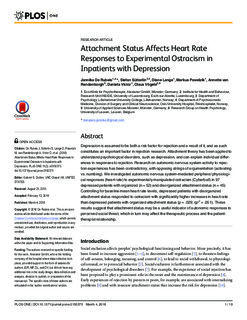Attachment Status Affects Heart Rate Responses to Experimental Ostracism in Inpatients with Depression
Rubeis, Jannika De; Sütterlin, Stefan; Lange, Diane; Pawelzik, Markus; Randenborgh, Annette van; Victor, Daniela; Vögele, Claus
Peer reviewed, Journal article
Permanent lenke
http://hdl.handle.net/11250/2405665Utgivelsesdato
2016Metadata
Vis full innførselSamlinger
Originalversjon
10.1371/journal.pone.0150375Sammendrag
Depression is assumed to be both a risk factor for rejection and a result of it, and as such constitutes an important factor in rejection research. Attachment theory has been applied to understand psychological disorders, such as depression, and can explain individual differences in responses to rejection. Research on autonomic nervous system activity to rejection experiences has been contradictory, with opposing strings of argumentation (activating vs. numbing). We investigated autonomic nervous system-mediated peripheral physiological responses (heart rate) to experimentally manipulated ostracism (Cyberball) in 97 depressed patients with organized (n = 52) and disorganized attachment status (n = 45). Controlling for baseline mean heart rate levels, depressed patients with disorganized attachment status responded to ostracism with significantly higher increases in heart rate than depressed patients with organized attachment status (p = .029; ηp2 = .051). These results suggest that attachment status may be a useful indicator of autonomic responses to perceived social threat, which in turn may affect the therapeutic process and the patient-therapist relationship.

